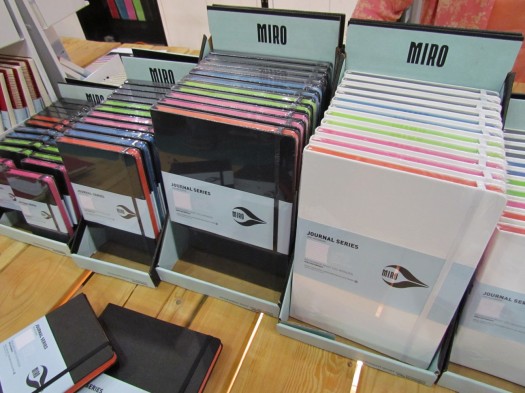Last week, we asked you to share your favorite writing prompts or exercises—and more than 70 of you responded via the blog, Facebook, and Twitter! Thank you. The randomly selected winner of the Miro journals is Catherine Campbell.
Below, we’ve selected some prompts that are either unique or that represent common approaches in the prompts that you shared (e.g., using photos or visuals as a story spark). We’ve also compiled a list of the resources you shared with us—look for that at the end of this post.
Writing Prompts and Exercises
I love Rex Pickett’s writing advice on Twitter. This is one of my favorites that always kicks me into action: “Writing for me was the taking of everything that was the worst of me & trying to transmutate it into art so that I could live with myself.”
Writing on a song and why it matters to you, or mattered to you can prompt weird sense memories and forgotten details. The first pop or rock song that appealed to you as a child, the missing pieces of adult experience to be filled in later. Listening to the songs that “changed my life” when I was thirteen can be thrilling to the point of synesthesia with notes, or really anticlimactic and empty, giving me the (possibly misguided) cool feeling I might be one-third less dumb. It is low pressure and takes you on flights of imagination and otherness which end up leading to either staring into space or, preferably, writing into it, and getting at something you might have otherwise missed.
—Shivers Q. Einstein
What works best for my own writing (either poetry or fiction) is the “THINGS PEOPLE HAVE TOLD ME” prompt. Write down ten things folks have told you or that you’ve overhead folks say that have impacted you, such as “You’re the best thing that ever happened to me” or “My father used to make us __” or “I think she’s an alcoholic” or “They used to hide gold in the baby’s diaper” or “She used to dream in German” … Choose one and either have your character say it, or have it said to them. It’s great for character development and writing dialogue.
My favorite prompt is a TREASURE HUNT POEM that came from a fellow PhD student in creative writing at Univ. of Wisconsin-Milwaukee who heard it from her professor, Bill Harrold. (I pasted the prompt below). My favorite aspect of this exercise is the sheer JOY and AWAKENING the students (I only used it for undergrads) experienced when writing the poem.
Treasure Hunt Poem
Go to the library. Wait until you see someone wearing a blue shirt headed towards a bookshelf in the stacks. Follow that person surreptitiously. Take out the book directly to the left of the book the person takes out, or closest to the point that you think they’re going to take out a book. Open the book at random and choose three words off a page. Photocopy that page, and circle the three words.
Go to the poetry section (roughly PR-PS on the 3rd floor here at UWM). Find a poet whose last name begins with your first initial plus three (ex. E + 3 = H) and is of the opposite sex as you. Turn to the final poem in the book. Read and photocopy the poem. The subject matter or theme of this poem will determine the subject matter or theme of your poem.
Go to the art section. Find a visual artist whose last name begins with the same letter as your last name. Open the book at random to a drawing, painting, or photograph. Make a photocopy. The title of the artwork will be the title of your poem. You will look at the art while you write.
Now, study all your materials one more time. Prop the artwork up in front of you. On the top of your blank page write the title of the artwork (title of your poem), and the three words you must incorporate. Reread the poem determining your subject matter. Now, write in white heat for twenty minutes. After your time is up, close your notebook and do something else. Come back to your writing at a later time and work it into a poem. Give yourself at least 20 minutes, no more than an hour, although this depends on your editing process. Turn in your photocopied materials with your final poem.
*You may turn this into an artistic collage (via cutting & pasting, using poster board and glue, etc.) or leave it black and white, as you see fit. Don’t forget to include your title! Also, be prepared to discuss your artistic process next week when you present your poem to the class.
A favorite prompt is to think of a situation confronting a character, but for which I don’t yet have a “solution.” Then I turn on a recording device and use a fake accent to mimic the voice and attitude I imagine the character would employ. The pressure from having to extemporaneously improvise what the character could say sparks new thoughts. Often there are surprises which are dredged out of my subconscious mind. However, sometimes the character breaks out into a song I never heard before. This can be a bit freaky.
A writing prompt I use often (and teach to others at every opportunity) is to take two dissimilar ideas and force them into a story together. The prompt can go even further to specify where the dissimilar ideas have to come from. For example, flip through a newstand magazine and randomly pull out two photographs. Now, FORCE those two items (pictured in the photograph) into a story. Let the inherent tension work in your story’s favor.
I have a circle of photographers and visual artists on Google+ and what I do is open that circle and start writing about the newest image posted, a free flowing, free wheeling bit of prose. If that doesn’t get the juices flowing I go on to the next, etc.
I’m always looking for novel ways (yes, pun intended!) to spark a deeper or more interesting point of view, so I’ll often take a page from a book I’m reading or writing and completely alter the point of view–first person to third person limited, for instance, or from the daughter’s point of view to the mother’s, just to see where the characters will take me.
Graffiti scribble the first haiku that comes to mind on an index card, even if it makes no sense, then write about what it means (or give it meaning) for 20 minutes. Might be good for nothing but usually can be drawn into some other work in one way or another.
If I had a magic wand, I would…
My prompt is my sleepy subconscious. I write as early as I can possibly wake and before my conscious thoughts get in the way. It’s astonishing to me what I create during my first cup of coffee and before the rest of the house wakes up.
I like putting my characters into situations that are 100% outside of my novel. So my protag might end up on the set of I Love Lucy or another 1950s-era sitcom. Doing this forces me to consider avenues of character exploration that I couldn’t otherwise get into because I’m so inside my novel world.
—AJ Sikes
My favorite prompt is usually a note to myself that I leave after I’ve written the last paragraph of the book I’m working on and am ready to call it a day. In other words, I always leave something unfinished, something to meditate on for the rest of the day and night.
I set aside an hour and roll a die, then multiply whatever number I roll by 10. That’s how many minutes I must sit with my backside in the chair and I must write something, but as soon as I put in my allotted time, I can go do something else.
This technique tricks me into starting, and usually even if I only rolled a 1, by the end of just ten minutes I’m so engrossed in my writing that I keep working anyway to the end of the hour. Sometimes I work even longer than that. Rolling the die makes it into a sort of game, like there’s a chance I could just roll a 10 minutes and be done with it. The die also takes the work of deciding how long to work out of my hands. After all, if chance dictates that I should write 10 minutes, then it’s not me being a slacker, it’s a decree from the Fates themselves.
Recommended resources
• Thinking, Fast and Slow by Daniel Kahneman
• Escaping Into the Open by Elizabeth Berg
• The Artist’s Way by Julia Cameron
• Crafting the Personal Essay by Dinty W. Moore
• The Art of Fiction by John Gardner
• The Pocketbook of Prompts: 52 Ideas for a Story by Kate Gould
• Prompt Inspiration by David Schlosser
• Friday Fictioneers (Facebook page), photo prompts on Wednesdays
• Our web editor’s 5 recommended prompt books








